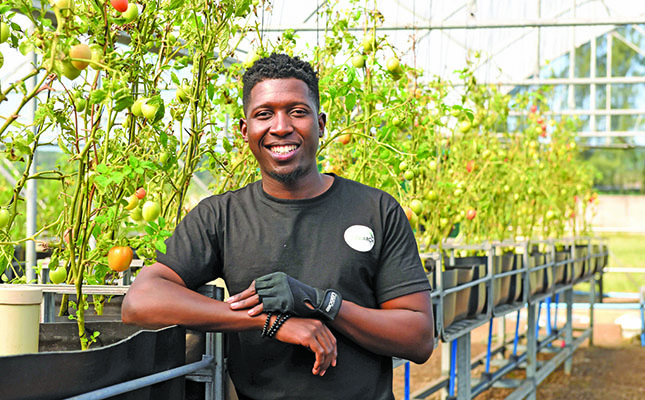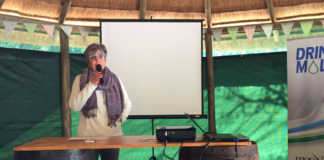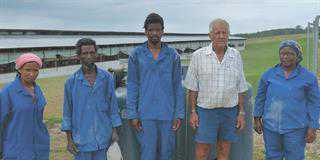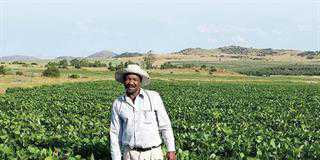
Photo: Supplied
Green Arch Innovations is committed to developing sustainable and competitive agricultural systems through the uptake of agricultural technology, innovation and climate-adaptive systems, and providing support in the supply chain for rural communities in South Africa.
This is the mission of Green Arch Innovations, according to founder Luvo Gugwana, who hails from the Eastern Cape.
Gugwana embarked on a journey to revolutionise farming practices through his aquaponics project in 2017, offering sustainable solutions accessible to a broad spectrum of farmers.
While pursuing a degree in medical orthotics and prosthetics at the Durban University of Technology in KwaZulu-Natal (KZN), Gugwana delved into entrepreneurship and established Green Arch, a company focused on aquaponics concepts.
The company’s mission is to introduce environmentally sustainable farming methods capable of meeting the needs of a growing population.
In 2017, he encountered aquaponics and delved into extensive research, realising its distinctive advantages over conventional farming.
The start of Green Arch
With backing from Ford, Gugwana developed a concept, firmly believing in the viability of aquaponics as a sustainable farming approach.
Nestled in the Noodsberg community in Ndwedwe, KZN, his first project emerged through a collaborative effort between the international non-profit organisation Enactus and the Ford Motor Company Fund, the philanthropic arm of the renowned global automaker.
Gugwana and his team implemented three aquaponic systems for Philani Ngcobo, the project’s beneficiary, who harboured a deep-seated passion for agriculture. Despite his enthusiasm, challenges hindered Ngcobo from realising an increase in his crop yield.
Explaining the set-up, Gugwana says that each aquaponic system comprises a fish tank and specific growing mediums.
“These fish tanks can each accommodate a minimum of 300 fish. Two types of growing mediums are utilised: one with clay balls for cultivating robust plants like cabbages, and another with floating raft systems for growing more delicate plants like lettuce.”
While acknowledging that the initial costs for establishing an aquaponic system can be substantial, Gugwana emphasises that the subsequent running and maintenance costs are comparatively low, making this innovative approach to farming both efficient and sustainable.
A large chunk of Gugwana’s funding comes from competitions that he has been successful in, such as Red Bull Amaphiko 2019 Social Entrepreneur, Engen Pitch & Polish 2022, and most recently the SAB Foundation Social Innovation and Disability Empowerment Awards where he placed third, among others.
Beyond the initial pilot site, the project has expanded to Richards Bay in KZN, where Gugwana is based, and a location on the KZN North Coast.
“Since the establishment of these projects there have been inquiries from municipalities for setting up commercial-scale sites, and we will soon be establishing 10 more sites in the Durban Metro area through partnerships.”
Gugwana says their systems currently grow tilapia and catfish and produce three varieties of crops, namely tomatoes, bell peppers and three varieties of lettuce: iceberg, green frilly and red frilly.
Aquaponics and its benefits
Speaking about what aquaponics is and what it entails, Gugwana says it is a technique that has its place within the wider context of sustainable, intensive agriculture.
“It offers supportive and collaborative methods of vegetable and fish production and can grow substantial amounts of food in locations and situations where soil-based agriculture is difficult or impossible. The sustainability of aquaponics considers the environmental, economic and social dynamics. Economically, these systems have low recurring costs, and the farmer leverages combined returns from both fish and vegetable sales.”
He says Green Arch’s aquaponics model provides an inclusive and sustainable farming practice that the vast majority of farmers can afford to emulate.
“Aquaponics minimises the need for synthetic fertilisers and pesticides, lowering the risk of pollution and minimising the ecological footprint of food production. Furthermore, the system’s recirculating nature cuts water use by 80%. Aquaponics prevents aquaculture effluent from escaping and polluting the watershed, supporting sustainability and reducing the environmental strain,” he says.
According to Gugwana, aquaponics is most appropriate in areas where conventional agriculture is less feasible, and in areas where water is scarce and there is poor soil fertility.
“Areas with silt soil, arid areas, sandy islands, and urban gardens are locations where the adoption of aquaponics systems can be viable. Aquaponics avoids the issues associated with soil compaction, salinisation, pollution, and diseases.”
Gugwana says aquaponics is quite adaptable and can be developed with local materials and domestic knowledge to suit local cultural and environmental conditions.
“It will always require a dedicated and interested person, or group of persons, to maintain and manage the system. Through this, it builds capacity and empowers unemployed youth with sound business skills as well as knowledge on hybrid agricultural systems.”
He says in term of the social impact, aquaponics contributes to improved food security, particularly in areas with limited access to traditional agriculture.
“At the same time, aquaponics integrates livelihood strategies to secure food and create income-generating opportunities for households. Domestic production of food, access to markets, and the acquisition of skills are valuable tools for securing the empowerment and emancipation of people in disadvantaged backgrounds, and aquaponics can provide the foundation for fair and sustainable socio-economic growth.”
Gugwana says one of the key objectives of Green Arch Innovation’s aquaponics franchise model is to contribute to capacity building, skills development, and development of sustainable and climate-resilient agriculture.
“Furthermore, our initiatives are addressing food security and the United Nations’ sustainable development goals. Aquaponics offers opportunities for community involvement and education, creating local food sources and fostering food sufficiency.”
Green Arch Aquaponics Franchise
The concept of the aquaponics franchise model was developed in 2019, Gugwana explains.
“Green Arch Innovations’ aquaponics franchise systems are an integral stance for a radical adoption of sustainable, climate-resilient agriculture and green technology shifts for both urban agriculture and rural agriculture as measures to address food insecurity and sustainable livelihood development in KZN and beyond. This model affords an opportunity for rural communities to participate in the aquaculture and ocean economy through inland aquaculture or aquaponics systems.
“Aquaponics is capable of playing an integral part in driving development of integrated food production systems. Its role for food security is particularly relevant especially with the global population growing exponentially. Arid regions suffering from water stress will particularly benefit from this technology.
“We partner with the private sector and corporates through their corporate social initiatives to bring this solution to low-income communities, and in this way we afford the opportunity to most disadvantaged communities to benefit from our systems.”
According to Gugwana, aquaponics franchise ownership empowers individuals to become entrepreneurs, fostering economic growth and self-sufficiency within their communities.
“Aquaponics supports the production of fresh, locally sourced and organic food, enhancing food security, and reducing reliance on outsourced food. Our franchising model creates employment opportunities, benefitting local communities by providing jobs in agriculture.”
South Africa is a semi-arid country, ranked as the 30th driest country in the world, making water a key constraint to agricultural development, Gugwana says.
“Furthermore, conventional farming is associated with detrimental environmental effects, relying heavily on inputs such as pesticides and fertilisers that lead to pollution and soil degradation, leading to loss of arable land. The uncertainty caused by climate change is forcing the sector to adopt more sustainable practices to increase its resilience.
“Through our company’s strategic expansion of franchised aquaponics systems across KZN, we are making a positive impact in various communities. These aquaponics farms are not just about sustainable food production, but also about empowerment. In each corner of the province we are fostering local job creation, improving access to fresh and nutritious food, and nurturing entrepreneurship. Our commitment to these communities goes beyond business; it’s about social and economic progress. Together, we are building a network of thriving aquaponics ventures that are transforming lives and contributing to a brighter and more sustainable future for KZN. Our projects are guided by the notion of local economic development, education and capacity building, while addressing the global predicament of climate change, drought, food insecurity, malnutrition and unemployment.”
Having a database of more than 300 farmers subscribing to Green Arch Innovations’ aquaponics franchise is an extraordinary achievement, Gugwana says.
“It signifies a demand for sustainable, efficient and eco-friendly farming solutions, and with this we are not only expanding our network but we also empower these individuals with the means to embrace modern agricultural practices. This presents an unparalleled chance for us to make a substantial impact on the agricultural landscape, fostering local food production, job creation, and environmental sustainability. As we join forces with these farmers, we are poised to drive a meaningful transformation in the world of agriculture, one that is socially responsible, economically viable, and environmentally conscious.”
He says thus far the projects have impacted more than 10 000 households through the supply of fish and fresh organic vegetables all year round in KZN.
“We have also provided training and capacity building for over 200 individuals and collaborated with higher learning institutions to promote industry growth, integrated learning and research. Through our aquaponics franchise, we have made a substantial economic impact by creating over 50 jobs and establishing new income streams.
“This initiative has not only provided employment opportunities but has also generated sustainable livelihoods for individuals and families in the communities we serve.
“Beyond these immediate benefits, the potential impact is even more significant. As our franchise network continues to expand, the number of jobs and income streams will grow, fostering economic resilience and stability. Furthermore, the skills and expertise gained through these roles have the potential to catalyse entrepreneurship and innovation, creating a ripple effect of economic growth.”
Processing, value adding and future plans
Gugwana says value-adding and processing of freshwater fish present numerous opportunities for farmers in addition to their crop yield.
“These activities can help maximise the economic potential of freshwater fish, reduce waste, meet the diverse demands of consumers, and help farmers enter into new markets. Our collaboration with universities plays a vital role in the context of offering research capabilities, technical expertise, and access to cutting-edge innovation. Universities play a vital role in developing and refining value-added fish processing techniques, exploring new product development, and ensuring high-quality standards.”
To this end, he says, Green Arch has established a partnership with the University of Zululand where they supply fish from their systems to their consumer science department and the hospitality department.
“We’ve been having such an amazing relationship because they’ve already introduced catfish and tilapia into the curriculum and we are supplying them with catfish and tilapia. They’ve done about five practicals where they process catfish into various products. They prepared catfish strips, catfish burger patties and catfish kebabs.”
He says his aim is to sensitise the South African community to eating freshwater fish, and he will be using the prize money from the SAB competition to expand and start a full-on processing facility where they will offer processing of the fish from their systems and supplying it to various markets such as restaurants.
Gugwana also wants to take education on the benefits of aquaponics to schools to foster interest in the system from a young age.
“I want to see our aquaponics systems across all South Africa’s provinces; there are many communities that really need these systems. We will introduce aquaponics as an alternative to traditional farming methods, so that we can help grow the agriculture sector in areas where traditional agriculture is not possible to apply.”
Phone Green Arch Innovations on 064 500 2368.










